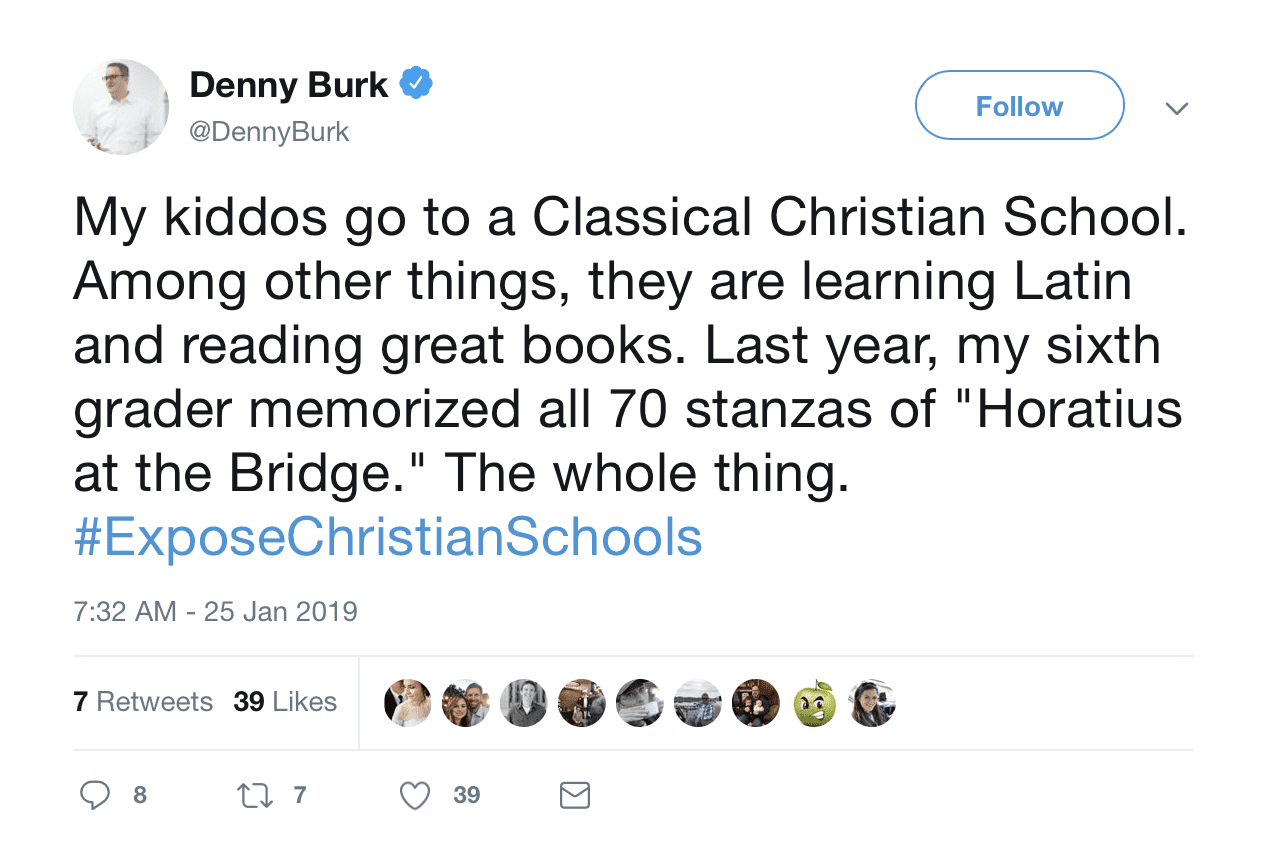Last week, the hashtag #ExposeChristianSchools went viral as individuals who attended fundamentalist Christian schools shared their experiences with racist curricula, sexist rules, and general miseducation. I didn’t attend a Christian school, and I’m not hugely active on twitter, so I mostly watched from a distance.
When evangelical pastor Denny Burk pushed back against the hashtag with this tweet, though, his words felt way too familiar:
Text of tweet by @DennyBurk: My kiddos go to a Classical Christian School. Among other things, they are learning Latin and reading great books. Last year, my sixth grader memorized all 70 stanzas of “Horatius at the Bridge.” The whole thing. #ExposeChristianSchools
I was homeschooled, and I remember this exactly. We thought we were special because we learned Latin and memorized old poems. Now I wish I’d studied something more, well, useful. Do you have any idea how often I wish I’d learned Spanish instead of Latin?
Knowing Spanish would be an extremely useful skill. It would increase my employability, yes, but I also live in an area with a large Hispanic population. Knowing Spanish would substantively improve my day-to-day ability to navigate relationships with those around me. If I knew Spanish, I could more easily set up playdates for my children and more effectively make Spanish-speaking parents at my kids’ public school feel welcome.
Instead, I only know Latin.
I’m working on learning Spanish as an adult, but it’s slow going. When I think of all of those years I poured into learning Latin—and all of those hours—I feel frustrated. Yes, I know a lot of word roots. And yes, I have some familiarity with declensions and language structure. But that’s about all I got out of all of those years. I dearly wish I had put all of those years and all of those hours into learning Spanish instead. But I didn’t.
I suspect that a lot of parents whose kids study Latin—parents like Burk—associate having their children learn Latin with a past when knowledge of Latin was inextricably intertwined with academics, higher education, and an educated elite. They tie a decline in Latin learning to what they see as an overall decline in academics and true scholarly study. They have their children study Latin in an attempt to get back to those days.
Well you know what? The academic nature of a period that shut out women, the poor, and those of other races, cultures, and ethnicities while promoting a colonialism that was based on a perceived superior intellectual capability is vastly overrated. Also? Those times are over, and we’re not going back there. Preparing your children for the wrong century is not going to help them succeed in this century.
Yes yes, word roots! Latin does help with word roots! That and learning the structure of language is about it, however, and there are more effective ways to learn those things than having a child spend years and years (and years, in my case) learning Latin. And there are ways to learn these things without shortchanging living languages that will help your child succeed in the twenty-first century.
Besides, learning Spanish can also help you learn word roots and language structure. And before anyone says learning Latin makes it easier to learn Spanish, I spent well over a decade studying Latin and I’m still struggling to learn Spanish. Learning any language takes time, and it turns out that Latin knowledge is not some sort of magic formula that unlocks all other languages. Besides, why not just go straight for learning Spanish?
Oh, and let’s talk poems! Because I did that too! I didn’t memorize Horatius at the Bridge, as Burk’s child did, but I memorized lots of other old poems—The Midnight Ride of Paul Revere, for example. Do you know how often that knowledge has helped me? Never. Literally never. Certainly, memorization stretched my brain—but Horatius at the Bridge? Need I mention again what century we’re living in?
My children memorize poems at school too—just different poems. Burk’s child memorized Horatius at the Bridge, by Lord Thomas Babington Macaulay? Cool. My daughter is memorizing Let America be America Again, by Langston Hughes. Have a look at the text of each and tell me which you think will be most useful in the twenty-first century. Then consider the value system that went into each school’s choice.
As a child homeschooled on a classical model similar to that provided at the classical school attended by Burk’s children, I spent a lot of time learning about the classics, studying Latin, and reading poems written by white men several hundred years ago. I spent almost no time learning about the civil rights movement and the history pf the black freedom struggle. I didn’t know who Nelson Mandela was. I didn’t learn about the history of diverse cultures and people.
It turns out that learning Latin and old poems does not make for a sufficient overall education, in the twenty-first century. Should we really be surprised that an education designed for a white elite busy colonizing the world might leave out diverse experiences and lives?
Burk mentions his kids reading great books. I’m curious which books he’s talking about. My parents read us books by G. A. Henty, a late nineteenth century English novelist who wrote dozens of novels positively portraying British imperialism. Even my parents were sometimes uncomfortable with the racist portrayals of the non-white characters the books’ colonizing heroes encountered, but still, they read on. Why? Because they believed in having their children read “great books,” and in our conservative community, anything written by a white man over a century ago that didn’t include subversive ideas was considered a “great book.”
Do you know what we didn’t read? We didn’t read books written by people of color. We didn’t read books that are now considered important social critiques. We didn’t read books with protagonists of color.
I can only recall one exception to this general rule: Roll of Thunder Hear My Cry. Written by African American author Mildred Taylor, Roll of Thunder Hear My Cry followed the struggles faced by an African American family living in Mississippi during the Great Depression. That book shook my world. And that’s the point. Kids need to be reading books like that, books expand their understanding of the world around them, books that challenge them to learn about the lives and struggles of other peoples, and other groups.
Burk and I are preparing our children for vastly different worlds. He is preparing his children for a past world that has largely disappeared. I am preparing my children for a future world that is already largely apparent. My children were born in the very last years when more white babies were born than non-white babies. My children will grow up in a world where 50% of their peers are non-white.
In a country where a quarter of their peers are Hispanic, my children need to learn Spanish. They need to know black history, and Latinx history. They need to know about the lives, cultural history, and experiences of other racial and ethnic groups. They need to be prepared to collaborate in diverse workplaces. Studying Latin will not help them learn these things. Memorizing Horatio at the Bridge will not either.
Burk may not be completely aware of the assumptions he is operating under. The text of his tweet suggests an expectation that everyone who reads it will be impressed with his children’s accomplishments. There is no awareness that someone like myself might read it and feel the opposite. I don’t think my own parents were fully aware of the dynamics at play in the way they educated me, either. They were surrounded by people who told them that this was what a good education looked like; they believed them. That was that.
How do we change this? We make it impossible for parents like Burk to think that what they are giving their children is everywhere acknowledged to be a good and thorough education. We force classical schools like the one his children attend to be honest about the choices they make when deciding what to teach children—and what to leave out. We flip the script. We change the narrative. We make people look forward, not backward.
Note: I don’t think studying classics is wrong, or that people shouldn’t learn Latin. I had quite a bit of fun doing both, and I do think there is a lot to be learned from studying classical antiquity. The problem I have is with the elevation of classics above other areas of study; the elevation of Latin above other languages. You don’t prepare your kids for the twenty-first century by giving them a nineteenth century education.
I have a Patreon! Please support my writing!
















